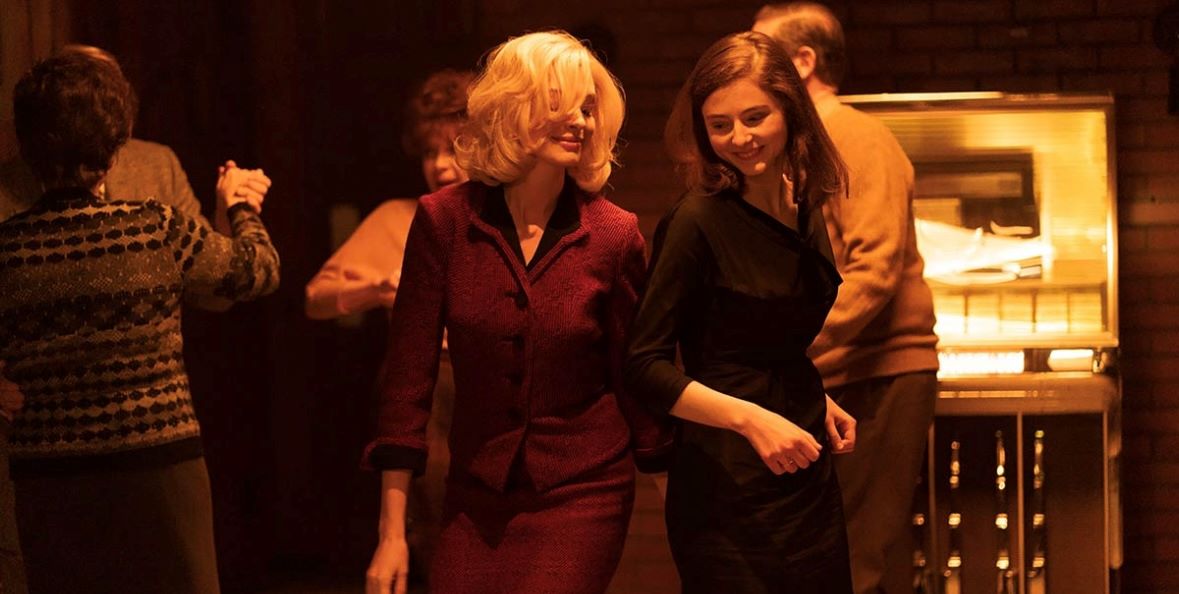The new film “Eileen,” set to open to limited audiences this Friday, December 1 (and wider reach on December 8), starts as a look into a quaint town in 1960s Massachusetts around the holidays and soon takes a turn from which there’s no going back.
The eponymous character lives out a mundane existence as her aging alcoholic father’s caretaker (played by familiar character actor Shea Whigham), providing for herself through an office job at the local boys’ penitentiary. When the new prison psychiatrist takes a liking to her, their budding relationship — somewhere between platonic, romantic, and conspiratorial — leads her down a path that pulls her from the ordinary into something else.
Eileen Dunlop is played by Thomasin McKenzie (“Jojo Rabbit,” “Last Night in Soho”), who shines in the role of a girl with minor ambitions constantly reminded by her father and others just how humdrum everything from her looks to her circumstances to her outlook is. Despite her receiving constant belittling, she manages to strike up something more than a friendship with Rebecca Saint John, played expertly by Anne Hathaway, an esteemed psychiatrist who comes to revolutionize the boys’ prison. Hathaway pulls off a good cross between an unconventional doctor who rejects the norms of the 1960s and a femme fatale of sorts, one who ultimately leads Eileen down a path of self-destruction and downfall. The cast is rounded out by Owen Teague (“Bloodline,” “The Stand”), playing a young inmate ultimately leading to the collapse of Eileen and Rebecca’s working and friendly relationship.
Eileen is based on the novel of the same name by Ottessa Moshfegh and was adapted for the screen by Moshfegh and her husband Luke Goebel. The novel tends to focus on Eileen’s internal turmoil and some of this is lost in the adaptation. However, in an interview with i-D, a bimonthly magazine put out by Vice, Moshfegh said it was, “A very faithful adaptation of the tone” of her original work. The book itself was a finalist for the Booker Prize and won the PEN/Hemingway Award, which lauds American authors who have not previously published a full-length book of fiction.
Cinematographer Ari Wegner (“Power of the Dog”) manages to transfer much of Eileen’s private troubles onto the screen. Director William Oldroyd (“Lady Macbeth”) drives the film toward a noir-like narrative, but this sometimes comes across in a heavy-handed manner. That said, the film’s direction and cinematography are excellent in their portrayal of a modern Hitchcockian piece. In an interview with Vanity Fair, Hathaway semi-jokingly described the film as “‘Carol’ meets ‘Reservoir Dogs.’”
Similarities to “Carol” are plenty, including a December-centric story of lesbian attraction between a mousy younger brunette and a more cosmopolitan older blonde, but its main difference lies in its scenery. The production design and cinematography convey a more brutal winter as opposed to one holed up with a warm cup of eggnog.
While the character of Rebecca insists Massachusetts is a place of, “No fantasy, no imagination,” Eileen would likely disagree. Oldroyd pulls this off by conducting disquieting daydream sequences that are edited to play as if they’re really happening. Oldroyd brings the narrative to life through brash ambition, which “Eileen” hides under its easygoing exterior, and with that is quite like its comically odd heroine.
The movie’s score was produced by Richard Reed Parry, of the band Arcade Fire. His jazzy, abrupt musical choices help convey both the sensuousness and impatience of the overarching story. It definitely matches the overall tone of the film and amplifies the message of catastrophe waiting to happen.
Eileen is a character, “Just filling space,” according to her own father, but by the end of the movie she has taken her life into her own hands and skyrocketed into a starring role.
“Eileen” is rated R for “Violent content, sexual content, and language and boasts a reasonable running time of 98 minutes. The review aggregator site Rotten Tomatoes lists the film as 89 percent positive based on 88 critics’ reviews with an average rating of 7.3/10. Meanwhile, Metacritic, which uses a weighted average, gave the film a score of 74 out of 100 based on 21 critics.
The Photo is a screen capture.
Stay informed. Sign up for The Westside Voice Newsletter
By clicking submit, you agree to share your email address with Westside Voice. We do not sell or share your information with anyone.








